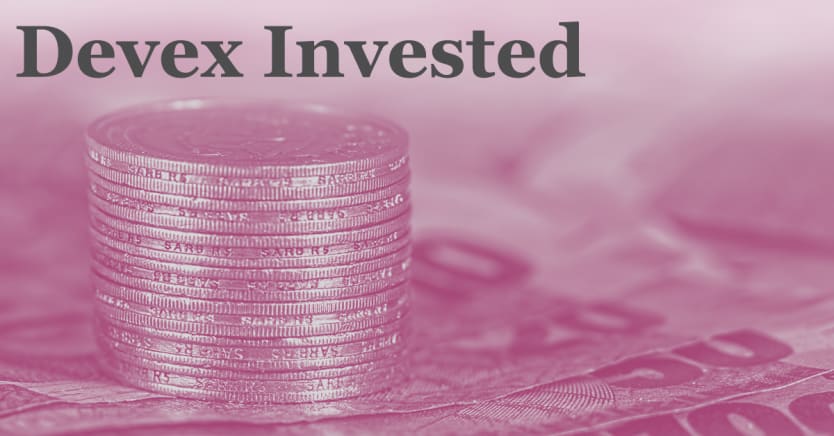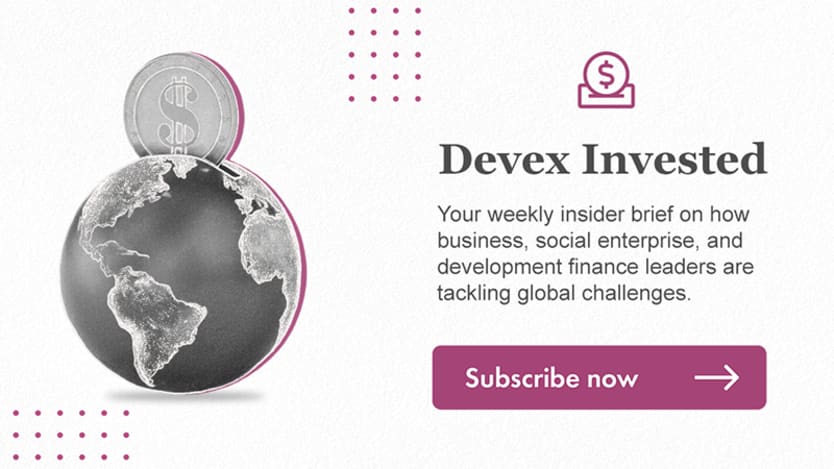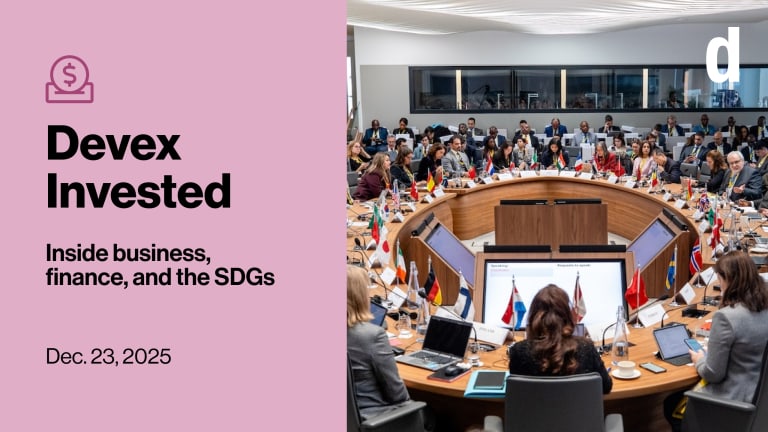Presented by Data.org

Delivery of vaccines to low-income countries was extremely slow during the COVID-19 pandemic, driven in large part by when they placed their orders with manufacturers. But could a different financing mechanism have made a difference?
A pair of researchers — Ruchir Agarwal from IMF and Tristan Reed from the World Bank — have come up with a proposal to address vaccine inequity in future pandemics, my colleague Shabtai Gold reports.
• Countries could create a new advance commitment mechanism with access to a credit line on “day zero,” such as the day the World Health Organization declares a pandemic, which would allow low-income countries to get in line to buy vaccines much earlier, they write.
• “This kind of financing facility would help avoid the issues that arose with the Access to COVID-19 Tools Accelerator, or ACT-A, which was hindered by delays in raising money from donors to place orders on behalf of low- and middle-income countries,” Shabtai reports. Donors eventually gave ACT-A $20 billion for vaccines, diagnostics, and therapeutics — but raising that amount took two years.
• The idea isn’t entirely new. An advance market commitment has been used before: More than a decade ago, donors gave $1.5 billion for a pneumococcal vaccine. The idea was to help de-risk and incentivize the investment in developing markets by assuring producers that the vaccine would be purchased.
This is a preview of Devex Invested
Sign up to this weekly newsletter inside business, finance, and the SDGs, in your inbox every Tuesday.
• But there are differences with COVID-19, World Bank officials say. And if the lender had directly funded purchases of vaccines, it would have competed with the international cooperative program COVAX. Higher-income countries also didn’t want COVAX competing with them for COVID-19 vaccines — so they may be hesitant to create an advance commitment fund that would do so in a future health crisis.
• One possible workaround, according to the researchers, is to have the private sector assume the credit risk through pandemic-linked bonds or have another financier, such as a bank, take it on.
Read: How to get vaccines to poorer countries quicker in the next pandemic (Pro)
+ A Devex Pro subscription brings you essential analysis, data-driven funding insights, and access to the world’s largest global development job board. Get these perks and more by signing up to our 15-day free trial.
On the rise
$95 billion
—That's the value of emerging market green bond issuances in 2021, according to the International Finance Corporation’s recently released Emerging Market Green Bonds Report.
The report finds that the volume of green bond issuances more than doubled from $41 billion in 2020. That level of growth might be challenging this year, given the economic fallout and supply chain disruptions exacerbated by the war in Ukraine. But the report sees the potential for green bonds in emerging markets and developing economies to hit $150 billion by 2023, with Chinese issuers leading the way.
Watch this space
Last week, Scott Nathan, CEO of U.S. International Development Finance Corporation, testified at a House committee hearing about the foreign aid budgets of a trio of U.S. aid agencies. Here are my key takeaways:
• Nathan is attending the Three Seas Summit in Latvia this week, where DFC has announced a commitment of up to $300 million in funding for the Three Seas Initiative Investment Fund to support energy and infrastructure investments. The investment is a key part of how DFC will look to fulfill Congress' request to invest in energy in Europe and Eurasia.
• DFC had made a commitment to reach net-zero carbon emissions by 2040. But it will continue to pursue some natural gas projects if they have a strong development impact, even as addressing climate change is a “critical part” of DFC’s strategy, Nathan said.
• The agency is looking to boost staff numbers to about 700 people, up from about 400 in 2021 — if Congress approves a funding increase.
• Competing with China is an important part of the agency’s thinking, policy, and planning, Nathan said. He told lawmakers to keep an eye out for potential new deals on telecommunications in the South Pacific and infrastructure in Africa that further this objective.
Read: What you need to know from US DFC, MCC, and Peace Corps hearing
Under the microscope
The latest development in the saga surrounding the United Nations Office for Project Services is that its board is cracking down. This follows revelations about a series of loans made by its Sustainable Investments in Infrastructure and Innovation — or S3i — initiative.
The board recently launched a series of reforms, froze all new S3i investments, and is calling for a third-party review to examine UNOPS' business model, including its oversight of S3i investments and of its wider portfolio. A working group will try to decide what happens next with its reserves and will look at UNOPS' fee structure.
Want to know more about how UNOPS works and its S3i scandal? My colleague David Ainsworth has painstakingly gone through the agency’s records.
DevExplains: An inside look at the UNOPS scandal
Opinions wanted
The Glasgow Financial Alliance for Net Zero, a coalition of financial institutions committed to a transition to net-zero greenhouse gas emissions by 2050, is seeking feedback on its new common framework. A draft report on net-zero transition approaches is intended to help financial institutions and their stakeholders judge the credibility of plans to accelerate and scale clean energy and transition-related finance.
“Without a clear framework for the transition, progress will be difficult to achieve. Filling the gaps of ambitious climate public policies and regulation, GFANZ has developed a global baseline for financial institutions to turn their commitments into immediate action,” said Mary Schapiro, the vice chair of GFANZ, in a statement.
ICYMI: New finance alliance aims to boost net-zero commitments
What we’re reading
Why are foundations and nonprofits losing public trust? [Devex]
The World Trade Organization finally agreed on a TRIPS deal. But not everyone is happy. [Devex]
Private equity should take the lead in sustainability. [Harvard Business Review]
Why investors are toning down climate demands. [Barron’s]









